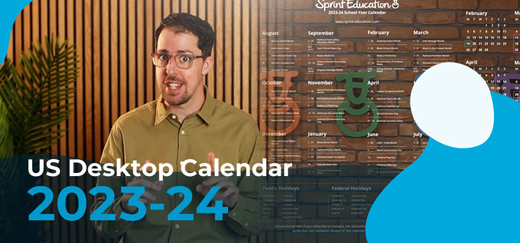How 3 Education Businesses are Reacting to School Closures
How 3 Education Businesses are Reacting to School Closures
Discover three real-world education marketing methods from our clients to successfully sell to teachers during school closures.
Discover three real-world education marketing methods from our clients to successfully sell to teachers during school closures.
When the idea of school closures first peaked on the horizon, and when news of the official confirmation broke, education-focused businesses across the nation were reunited in one overwhelming panic. For days, all anyone could do was ask the same questions; what this meant for their business, how they should proceed with their education marketing, and what the long-term effects on their operations would be.
But it was the days and weeks after where businesses would begin to take different routes. For some, it became evident that they’d need to march on, albeit with some necessary changes to their marketing plan. Others opted for a seemingly safer approach - shutting down communication and lying low as a means of self-preservation. But, as it turns out, that approach may not be safer at all – in fact, it may be having a detrimental, potentially permanent effect on their businesses.
We’ve highlighted three clients’ real-world approaches to school closures to give you a run down of what you should already be doing, what you need to do today – and what you should most certainly avoid doing tomorrow.
#1: The Leader of The Pack
Business number one is a shining example of the positivity and acceptance any education business needs to give their operations the best chance of survival once the dust settles.
Specialising in playground design and installation, high-value, non-impulse products and services that require face-to-face contact and in-school visits, this company could have seen the school closures as end to their success. But these leaders didn’t shy away in the hope that luck would stay by their side. Instead, they did quite the opposite; upgrading their Campus account (the world’s leading education data, marketing, and sales platform for education businesses) and monthly credit limits in order to ramp up their communications and send more emails out than ever before. Note: Campus users have the ability to send their emails to the direct inboxes of over 350,000 teachers/staff if they wish.
With some quick-thinking and sensitive yet proactive approach to their marketing emails, they were able to, very easily, adapt their business model to suit the current climate. When the inevitable influx of cancelled site surveys came through to them, they were already set up and could quickly convince the schools to jump on a Zoom video call instead. To accommodate the schools as best as possible, they even refused to limit themselves to meetings only in during school hours; offering early morning or evening calls to fit around busy school staff with young children at home. This resulted in dozens of site surveys being saved and carried out via video link.
The majority of their success during the closures has been entirely self-led, but they were able to take advantage of their competitors’ silent stance; their biggest opponents ceased all school marketing, leaving the door wide open for our pack leaders to pounce. As we published in our latest report, The Impact of COVID-19 on Marketing to Schools school budgets were still released at the start of April as usual, and school leaders’ research and buying habits have continued as normal. This is a key time for any business to be selling to schools, but particularly for this company whose high-value playground designs/installation are typically purchased during this budget planning period. Continuing to sell when their competitors had retreated was a no-brainer, and their agile operations plus sheer positivity and kindness has had a clear, significant impact on their lead-nurturing and sales.
#2: The Flexible Force
Business number two took a leaf out of business number one’s book, opting to stay positive and flexible as opposed to making a hasty retreat. Being a provider of live, in-person courses, they weren’t able to adapt as easily as the previous business. The government’s decision to cancel all mass gatherings had taken the decision out of their hands, and their courses were immediately postponed.
Not wanting to reschedule without a definite lockdown end date in sight, and moreover not wanting to let down the hoards of teachers who’d already booked onto the courses, they knew they needed an instant plan B. With some swift action and incredible, well-oiled-machine teamwork, the company were able to completely digitise their service using remote video seminars and online resources.
In this position, it wouldn’t have been out of the question for them to find ways to cut corners and try and reuse as much of their original marketing plan as possible. However, knowing the change in situation called for a change in tone to their marketing, the company opted to prioritise the quality of their marketing and rework the plan however necessary to maximise the results of their marketing campaign.
The changes to their service also highlighted a new USP – the flexibility of the remote seminars and online resources. No longer constrained by distance or timings, teachers were now able to login directly from their homes and access the resources 24/7, and take part in seminars now scheduled to fit around the new working day. Overall, their new offering has not only proven itself to be incredibly valuable to the teaching community in this current climate, but also proven what their team are capable of, no doubt spurring them on to continue producing dynamic, conscious marketing long after the pandemic is over.
#3: The Curled-Up Hedgehog
While business number one is soaring with their unwavering attitudes, and business number two is thriving because of their willingness to adapt, business number three is faring less favourably.
Every single business has been understandably worried, conflicted, and unsure about the current situation and what to do with their education marketing. But while businesses like our first and second examples have stood up, shaken themselves off, and marched forward with their new plans (even if apprehensively), other companies have yet to progress. Still worried and conflicted, business number three has curled up like a hedgehog, not doing anything, hoping they can ride out the storm.
As reported in our latest report, The Impact of COVID-19 on Marketing to Schools, teacher inbox traffic has fallen by a huge 68%, yet teachers are checking their inboxes twice as often for support. Those businesses who’ve continued their marketing will now have far less competition, and have a good chance at moving teachers through the customer journey quicker than usual. When the pandemic is over, these companies will already have a foot in the school door and a place in their hearts for the support, flexibility, and contingence they gave them during the closures.
For the business-number-threes, they’ll have missed out on this essential contact. They’re not finding new leads, and they may not be nurturing the ones they have, so when business as usual resumes, they may find their customers have gone elsewhere, leaving themselves all the way back at square one. And with so many other business-number-threes all desperate to regain footing and rebuild their databases of leads, there may not be enough to go around.
The way businesses treated not only their staff but their teacher audience during the school closures will be remembered long after COVID-19 has succumbed. The businesses who took a chance, rose above, and did everything they could to support school staff – a major group of keyworkers – will be remembered and rewarded with long-term business.
Of course, it’s easier said than done to adapt your business, particularly when we’ve never experienced school closures quite like this before. Our first two businesses have had to adopt new business models overnight, with no external guidance or previous attempts to take inspiration from. For some businesses, this might be difficult, timely, and expensive, and required all hands on deck. But, with careful planning, an accurate knowledge of how teachers are currently acting, and some expert help, they’ve proven they can bloom even during times of disaster.
The only real way to fail is to not try – as the first rule of selling to schools goes, companies that don’t innovate or adapt will fail. But don’t panic! We’re here to help every business – pack leaders and hedgehogs alike – stay afloat with COVID-19 updates that will affect your business over the coming weeks, and tailored advice on how best to manage them.
If you’d ever like a free strategy chat, click here to book a call-back with our award-winning edu-marketing experts.
Tags
Education Marketing
Email Marketing
Email Schools
Email Teachers
Emailing Teachers in Schools
Marketing to Education
Marketing to Schools
Marketing to Teachers
Selling to Schools
Selling to Teachers
Similar Articles


Marketing Courses, Training, and Workshops to Schools
Learn 10 game-changing insights especially for pupil course, training and workshop providers to enhance your education marketing campaigns when emailing schools.


Turn timing your education emails into an artform!
Gain exclusive insights into the timing of your education marketing emails to engage with your target audience and increase your sales potential.


Expert marketing to K-12 support and solutions
Expert marketing to K-12 solutions
Email Principals, Teachers, and District Staff Inboxes
Email teachers and staff inboxes
Sell More to US and Global Schools and Districts
Sell more to schools and districts
































